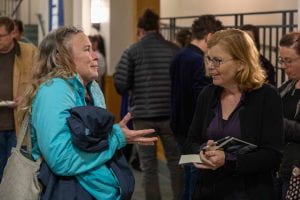HANOVER, N.H. – October 23, 2019 – How does the world end? What will bring society down? What would happen if the refrigerator stops working?
These are the questions – both large and small – that were addressed by award-winning speculative fiction writers at the Neukom Institute Literary Arts Awards.
In a night dedicated to the literary genre that H.G. Wells called the “fantasias of possibility,” 2019 Neukom Award winners Audrey Schulman and Peng Shepherd discussed everything from pandemics to process as they explored their prize-winning works of “spec fic.”

While introducing the 2019 award winners, Dan Rockmore, director of the Neukom Institute for Computational Science, remarked on speculative fiction’s ability to enable readers “to explore the liminal space between the possible and impossible.”
“As a genre, speculative fiction is as shape-shifting as the literature it comprises,” said Rockmore, creator and director of the awards program. “This artistic work explores the possibilities rendered by technology and science generally, both good and bad.”
The discussion that followed explored the many contours of spec fic, including its critiques of technology and society.
“I just love dystopian fiction,” said Schulman, winner of the 2019 Neukom Award in the open book category. “It just automatically pulls you in. It is also a social critique at the same time, because you are always wondering what will bring society down and these books help you begin to imagine that.”
“You spend a lot of time plot-wise thinking about the really big [things]: ‘What ends the world?’ or ‘Which cities fall?’ or ‘What happens to the government?’ ” said Shepherd, winner in Neukom’s debut author category. “[But] sometimes, it’s just more interesting thinking about what are you going to do now that the fridge doesn’t work anymore … I find that a lot more intimately scary and interesting.”
Schulman and Shepherd were each presented with a $5,000 honorarium at the Neukom Awards event after having been announced as winners earlier this year.
Both of the winning works demonstrate how the setting of an imagined future can be used to explore and expose universal questions of human nature.
Shepherd’s “The Book of M” (William Morrow, 2018) details a near-future world in which people suffer from an epidemic of memory loss. Schulman’s “Theory of Bastards” (Europa Editions, 2018), also set in the near future, explores survival and evolution at a primate research facility.
“There are some echoes between the two novels,” said Jeff VanderMeer, a best-selling author and co-judge of the 2019 award program. “One is this idea of the breakdown of civilization as we know it, and the loss of those things we take for granted in our daily functioning in the world.”

Both Jeff VanderMeer and Ann VanderMeer, a Hugo Award-winning editor and Neukom co-judge, joined the 2019 award winners to discuss issues raised by the spec fic genre.
Remarking on technology in society and as a subject of speculative fiction, Ann VanderMeer said that technology frees people to do many things, “so there’s good and bad in it.” In reflecting on the award-winning works, she noted how characters rely on scientific thinking to solve problems. “Even in both of your novels, even though these horrible things

are happening, people are using their ingenuity and scientific methods to overcome the adversities that they are facing.”
The Neukom Institute awards program was created in 2017 as part of the Neukom Institute’s mission to explore the possibilities of computational science.
The awards event took place on October 16 on the campus of Dartmouth College. Playwright Francisco Mendoza was awarded the 2019 Neukom Award for playwriting for his play Machine Learning at a separate event earlier in the year.